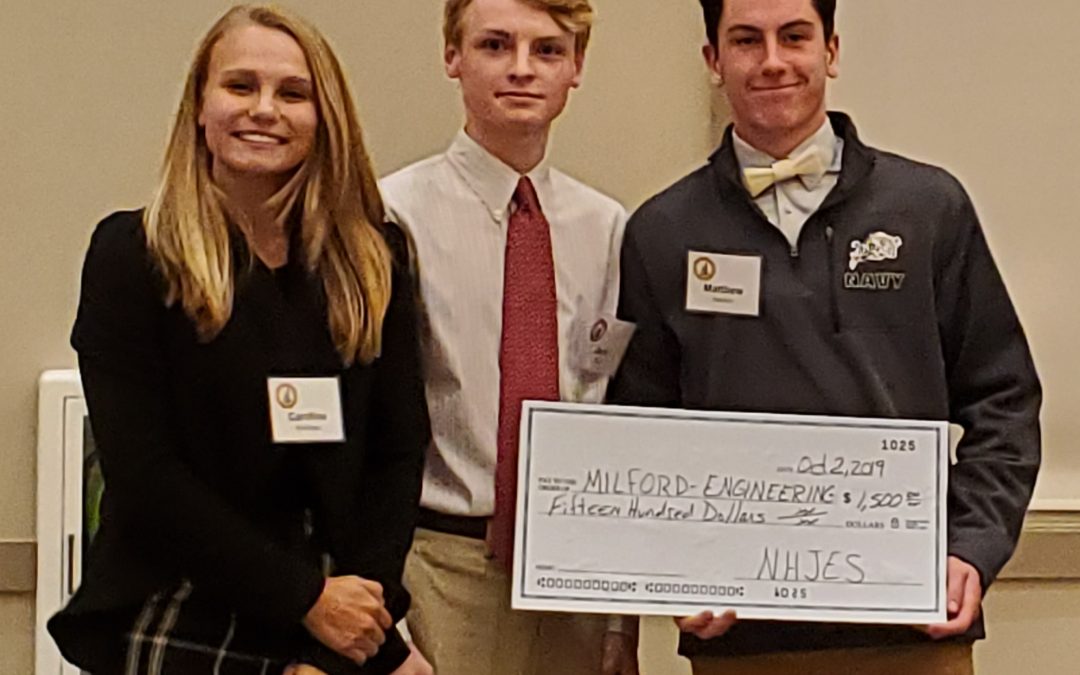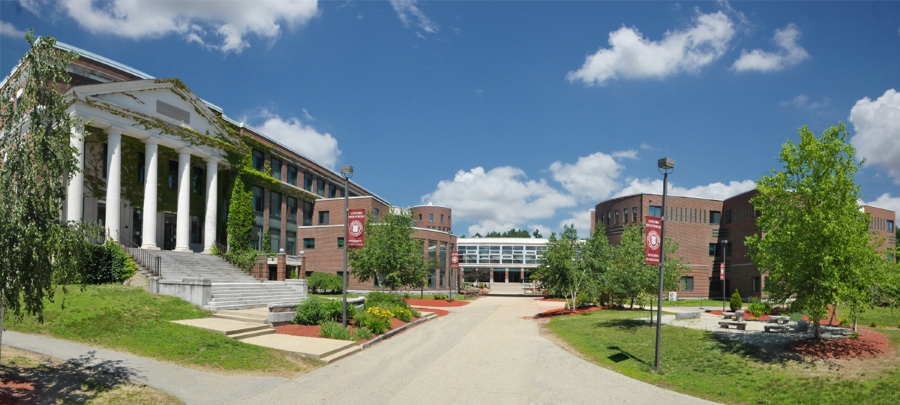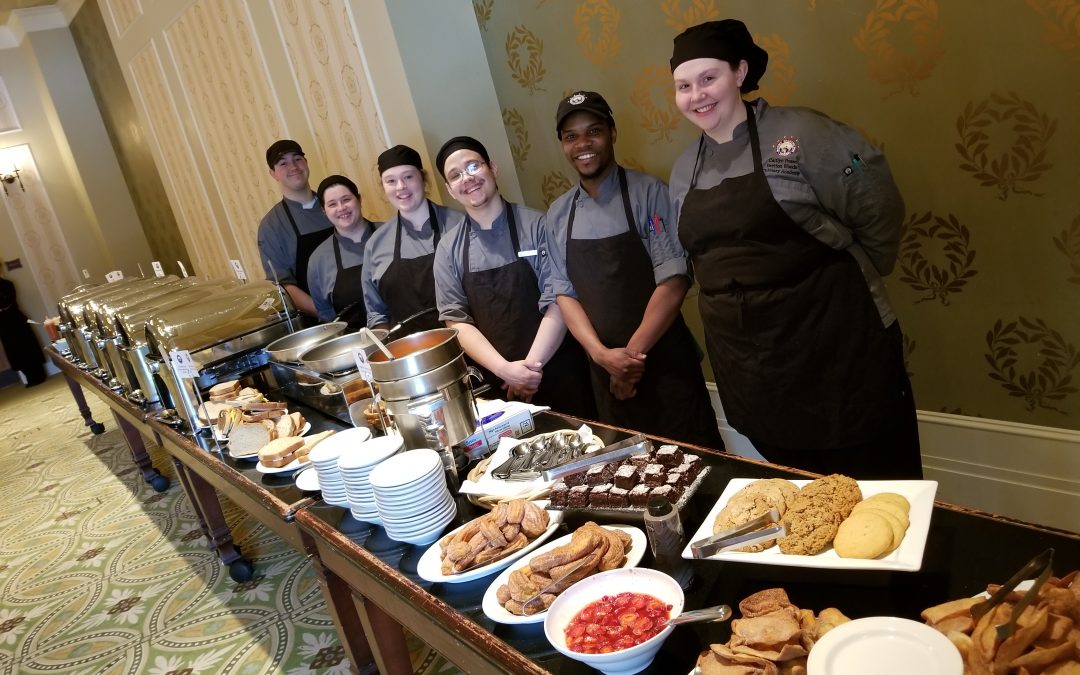
Oct 18, 2019 | Article, Impact, Programs
On October 2, the New Hampshire Joint Engineering Societies (NHJES) held its 13th Annual Conference, highlighted by a live demonstration from students from St. Thomas Aquinas in Derry.
“They were able to demonstrate the skill of the VEX IQ robot picking up cylinders in an agility style movement,” said NHEJS Board Member Frank Xydias, who teaches at Milford High School & Applied Technology Center. “It was great.”
Representing the third year running in which the conference included secondary teachers and students, this year’s conference featured several other presentations.
Students from Manchester Community College’s Workforce Development Summer STEM Camps showcased their 3D printing and robotics skills. In addition, Milford High School & Applied Technology Center’s Engineering and Career Focus Internship students discussed their programs.
“The conference provides an opportunity for students to connect with professional engineers from across the state,” added Xydias. “It’s a chance to learn about career pathways, career planning and network as a junior engineer.”
NHJES Chair Michale Bogue commented on the skills and preparation demonstrated by these students.
“Our society has expressed a desire to stay true to our mission, which is to provide education, leadership, and support,” he said.
“We do this for both our adult members and our future members, the students in attendance, added Xydias.
Members in NHEJS include New Hampshire Society of Professional Engineers, American Council of Engineering Companies, American Society of Civil Engineers – NH Section, IEEE – New Hampshire Section, Society of Women Engineers, Southern New Hampshire, and Structural Engineers of New Hampshire.
At this year’s conference, Keynote Speaker Dr. Cist, Vice President of R&D for Geophysical Survey Systems in Nashua, told stories of applications of ground penetrating radar systems.
“While it is a subject that sounds like it would only apply to engineers in the field, his illustrations and stories captivated us all,” recounted Xydias. “He also challenged all the students in the audience to follow their passion for engineering, because it is a career that does a lot of good.”
It is also a career with “tremendous diversity,” as he said there are more than 40 types of engineering degrees and a number of subcategory professions,” he said.
“An engineering career can lead to many other professions,” he added. “It is not exactly what people think, which is why this conference is important, because it helps to paint that broader picture.”
As for the future of engineering, Xydias said it is unknown to a certain extent, which makes the field so intriguing.
acknowledged he is not sure, which he said makes the engineering field so interesting.
“The careers that students will be going into in 10 years have not even been developed yet,” he said. The future is wide open, and engineering is going to be behind many of the advances that shape how we live.”

Sep 17, 2019 | Impact, Leadership
Recently, David Ryan, Superintendent of School at SAU 16, spoke about the importance of helping build pathways to careers for students at Seacoast School of Technology, a topic he feels should receive more attention.
“The current state of education includes multiple pathways for students that don’t resemble traditional schooling of years’ past,” he said. “We have more K-12 students learning in community settings, colleges and universities, internships, independent studies, and extended learning opportunities.”
These opportunities, he said, stand in stark contrast to prior educational models in which students “were required to sit for a definitive number of hours in a classroom chair and learn only in the schoolhouse.”
“The roll-out of competency-based education as a regulatory requirement in 2005 was groundbreaking in terms of requiring it in all schools,” he said.
Ryan said the concepts behind competency-based education have been alive and well for years in career preparation models, such as CTE and corporate-sponsored training programs. These models, he noted, underscore a very important shift that has begun and will continue to take place in education.
“We have begun to talk seriously about training students to be thinkers and leaders as opposed to rote memorization of facts and redundancy of skills,” he said. “Students need to be able to assimilate and adapt to the changing labor market.”
The concept of “career pathways” is not mere ,either.
“Science and technology move too rapidly to single out one specific career path,” he said. “Building a fundamental skillset on the basics of science and technology and then applying those basics to increasingly complex experiences that promote inquiry, prototyping, and discovery will be the new way to learn.”
He said this new way to learn rests on partnerships between schools and industry.
“We need our community partners and business leaders to begin providing those experiences and guidance now,” said Ryan, who said the economic lever of every community is its school system.
“In New Hampshire, real estate values rise and fall depending upon the quality of the education people believe their children receive,” he said. “The quality of the education can depend quite heavily on the financial support it receives from the town.”
He said that employers seeking quality job candidates, particularly those with young families, find it much easier “to recruit and hire the very best” when they are able to demonstrate the strength of the schools.
“A high quality school traditionally attracts families who value education, making it easier for businesses to not only stock their rosters but thrive in retail settings,” he added.
Noting schools are “preparing the employees of tomorrow,” Ryan said it is critical businesses and schools work together to complement an educational program that includes adaptability to changing markets and accessibility to good paying jobs.
“This is essential if communities are going to sustain their quality and growth by keeping our graduates here,” he said.
Presently, Ryan said this is an issue that is not receiving the proper attention it deserves.
“Thankfully organizations like NH Coalition of Business and Education, Stay Work Play NH, and the Governor’s Task Force for the Recruitment and Retention of a Young Work Force for NH are addressing it with gusto,” he said.
As for steps he is taking in his own district, Ryan said they are expanding their Extended Learning Opportunity (ELO) program to include a full time coordinator.
“We want to better serve the individual needs of students who are seeking such opportunities as well as expand and introduce them to the meaningful and rich experiences from among a more broad array of organizations,” he said.
He said that part of this process will include guiding students through some form of personal reflection to help them understand self-knowledge and the impact that has on their outlook to the future.
“ELOs can do this, but we also want to enhance our internships that currently exist with our current business partners by introducing cooperative education experiences that involve full-time employment that carries academic credit,” said Ryan.
He said their goal in SAU 16 is to create more opportunities for students to discover their passion and then create a supported path of exploration.
“We believe this will allow our students to really focus more on what they want to do after graduating from high school and be better prepared to do it successfully,” he said.
To learn more about SAU 16, visit sau16.org.

Aug 9, 2019 | Impact, Teachers
While English is often viewed as a stand-alone academic subject, Beth York, English teacher and reading specialist at Concord High School, said it is time to rethink that paradigm.
“Most people in the working world will be using their literacy to persuade, inform, instruct, remedy, or collaborate in order to achieve a goal,” she said.
Citing many high school English teachers as “very good” at teaching persuasive, informative and narrative writing and speaking as well as careful, analytic reading of great literature, York said she and other Concord English teachers have been trying a new approach.
“Through Career Communications class, we are striving to place student literacy instruction into contexts they will one day encounter in the workplace,” she said.
While students typically associate English class with novels, films and poetry, York said the reality is that they will spend their days in the workplace leading meetings, engaging with customers, or drafting content for stakeholders.
“They will use their literacy skills to ask for raises or promotions and to direct their professional lives,” said York. “The classroom and workplace experiences should not be so distinct.”
She said great novels, poems, films and essays still have their place, however, as she noted they make us better thinkers and human beings.
“Reading rich, honest storytelling makes us more empathetic and enables us to engage more fully with the world and with each other,” she said. “We need to keep these inspirational aspects of literacy instruction while adding the more aspirational ones.”
These aspirations aspects will assist students in learning how to persuade or negotiate in the workplace using audience awareness and sound reasoning.
“Once in the workplace, they won’t often write five paragraph essays, but they will need to understand how to adjust the structure, tone and content or their writing to effectively reach particular audiences for particular purposes,” she said.
With these ideas in mind, York said Steve Rothenberg, Concord High School’s CRTC Director asked her to collaborate with him and other English teachers to design and launch Career Communications.
“I immediately signed on,” she recounted.
Designed with an optional ½ credit Extended Learning Opportunity (ELO), the course is comprised of classroom time learning, practicing and demonstrating English skills, research and a project in the field or outside of class.
“In this class, I hope to help students develop literacy skills and habits that can support their future workplace success,” said York.
Success in the course is defined across 5 core competencies.
Competencies:
- Reading: Students will demonstrate the ability to comprehend, analyze, and critique a variety of increasingly complex print and non-print informational texts.
- Writing: Students will demonstrate the ability to write different texts for different purposes, including reasoned arguments backed by evidence, informative texts conveying complex ideas, and narratives.
- Research: Students will demonstrate the ability to locate, compile, organize, analyze, integrate and present topical information.
- Speaking, listening and viewing: Students will demonstrate the ability to listen and view critically and to speak purposefully and effectively for a variety of purposes.
- Technology: Students will demonstrate the ability to use multiple forms of technology, including digital media and the Internet, to access, evaluate, organize and communicate information.
The goal of the course, noted York, is “to enable students to positively impact their future workplace and to further their own career through the skillful application of effective reading, writing and interpersonal communication strategies.”
To prepare to teach the course, she said she spent time interviewing industry professionals in fields relevant to her CRTC students’ programs, listening to CRTC colleagues and reading everything relevant [she] could get [her] hands on.”
“I interviewed several industry professionals, including the Director of Human Resources from Concord Hospital, a local fire captain, the service manager of a large auto dealership, a police detective, the president of a large construction firm, two salon owners and others.
“I wanted to learn about the literacy skills they use daily, the materials they read to stay up-to-date in their fields, and the skills and qualities they look for in new hires,” she said. “These conversations and experiences helped me to create a framework for teaching this course.”
Through this research, she said she was able to recognize universal skills common to each workplace.
“In all career fields, we will need to inform and persuade,” she said, “and there are universal strategies for doing so effectively and in a manner that will generate return customers or support collegial relationships.”
York also found several skills unique to each workplace.
“The audience and context within which a police officer or EMT works is different from that of a graphic designer or chef,” she explained. “Students need to practice applying skills flexibly with consideration of the contexts and audiences they will likely encounter in the field.”
For York, the course underscores something that should be fundamentally understood in today’s education model.
“I believe that our ability to read, write and speak effectively serves as our bridge to the wider world,” she said. “It is how we how we come to understand, engage with and sometimes shape our society.”
In part two of this two-part series, we look more closely at Career Communications at CRTC.

Jul 4, 2019 | Industry, Leadership, Programs
There are many pathways into a career, which underscores New Hampshire Lodging and Restaurant Association’s role in Carroll Academy, an adult high school program in Tamworth, NH.
“In this current workforce climate, you need to look into every possible resource and partnership,” said Amie Pariseau of New Hampshire Lodging and Restaurant Association (NHLRA).
Whereas much of her work consists in partnering with New Hampshire Career and Technical Education Centers, Pariseau said she saw an opportunity with Carroll Academy, which has resulted in Introduction to Hospitality.
Aimed at adults who do not have their diploma or HiSET (high school equivalency like the GED), the program is collaborative in nature, according to Crystal Sawyer, director of Carroll Academy/Carroll County Adult Education.
“I was approached in May of 2018 by Amie and Christina Baker from the Mount Washington Omni Hotel, to see if I would be interested in teaching a certified Hospitality course,” she explained.
In September of 2018, Sawyer said Michelle Hart from NHWorks indicated they could partner with the group and could pay for the class for any student eligible for a Basic Skills grant.
“If the student was making under $15 and was looking for a job in hospitality, they could take this beginner’s Hospitality class,” said Sawyer. “NHWorks would also help them find a job after the class in the field.”
In designing the certified class, Sawyer chose the AHLEI START (Skills, Tasks, And, Results, Training) 180-hour Curriculum Program. The START Program, she explained, is basically an introduction to every position in the hospitality sector — Front Desk Representative, Security, PBX Operator, Bell Attendant, Maintenance, Laundry, House Keeping, Food and Beverage, etc.
“At the end of the course, the student takes a final,” he said. “If they pass that, they get a START Certificate that they can show an employer.”
Noting the first class ran once each week with three recent graduates, Sawyer said Carroll County Adult Education is the first Adult Education center in the state to teach this certified AHLEI START course.
“We also have an Articulation Agreement with White Mountains Community College stating that our Hospitality course is considered a 3 credit course for their Introduction to Hospitality program,” she said.
Students in the class are diverse.
“I have an ESL student that has been with us for years and would like to switch career paths,” said Sawyer. “Another student is a former HiSET graduate who works in hospitality and would like to move up the ladder with her certificate.”
According to Pariseau, NHLRA could not be more excited about the possibilities for the program.
“We hope to see it grow and taught at other centers,” she said.
Currently, Pariseau said there are in fact plans for Manchester Adult Education to role out a similar program this fall.
Regarding the program at Carroll Academy/Carroll County Adult Education, which may soon include an apprenticeship track, she said students receive much more than an introduction to the hospitality industry.”
“They are receiving a nationally recognized certificate and a pathway to continue their education if they choose to do so,” she said.
In looking ahead at NHLRA’s role in general, Pariseau stated, “We will continue to support the efforts of all of our education partners as we look to continue to build a workforce pipeline and support current workforce needs of the industry.”
To learn more about NHLRA, visit https://www.nhlra.com. To learn more about Carroll Academy, visit https://www.carrollacademy.net.
.

Jun 20, 2019 | Industry, Programs
To meet the workforce demands, Omni Mount Washington Resort has developed Bretton Woods Culinary Academy (BWCA) in partnership with White Mountains Community College (WMCC) and the NH Department of Labor.
A 3-year program, BWCA allows students to enroll in WMCC to work on their Associates Degree in Culinary Arts and attend classes at Omni.
“They work with chefs on property and learn about different subjects to cooking,” said Joseph Madzia IV, Executive Sous Chef at Omni. “The school sends their chefs here to teach the lecture classes and the students attend the school for their math and English classes.”
The program also consists of an apprenticeship in which students work full-time and receive compensation.
“They get to move around the resort in different positions learning from all of our wonderful chefs, supervisors, and fellow cooks,” said Madzia, who stressed the importance of the program.
“The students are our future,” he added. “We take the time to teach them so they are ready for a job. We want to see these students graduate and go onto higher positions leading their own team.”
He said their goal is to not just teach them culinary basics, but provide them with a strong foundation to continue their career with Omni.
“We hope the training they receive from us will offer them better job opportunities since they will finish with an Associate’s Degree, 3 years work experience and completion of an Apprentice Program,” he said.
For Madzia, the apprenticeship aspect of the program is particularly important, which said they customize to suit their needs at Omni.
“The students are taught all the basics and advanced skills they would get if they attend the school but the 3 years of experience helps jump start their career,” he explained. “We use this opportunity to cover all the standards the college would teach but go more in-depth with standards our specific hotel follows.”
He said program graduates are great candidates for the Omni brand, which enable them to immediately hire them into positions that directly impact the workforce shortage.
“We have been partnered with the NH Department of Labor in efforts to maximize this program to support our state,” said Madzia. “This program is an interesting way to think outside the box to find and train new chefs.”
In reflecting on the strength and relevance of BWCA, Madzia contrasted it with his own experience as a student and aspiring chef.
“I attended a culinary school where I spent two years attending class full time,” he said. “I needed to pick up a part time job so I had money, but the jobs I had were not the best. I didn’t get to use that work experience on my resume after because some of the jobs I had were simple.”
He said BWCA, however, provides both educational and hands-on training as well as networking opportunities that often help open doors.
“If the students put a little money from each paycheck aside on their own, they can pay for their classes as they go and be debt free from school at the end,” he said.
Currently, BWCA has six students with two starting their third year and graduating in May of 2020.
“We are very excited for this class’s graduation, because it will be our first one,” Madzia said. “We wish them great success in this career. The other four students will graduate in May 2021.”
BWCA is currently accepting applications for incoming freshmen. To learn more, visit https://www.brettonwoods.com/bwca.





